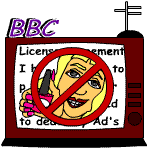The BBC
Created | Updated Jan 28, 2002

The British Broadcasting Corporation, abbreviated to the BBC, is a public service broadcaster for the UK, based in Shepherds Bush, West London. It is funded by a 'licence fee', which is basically a tax levied on all people with a TV. This gives the Beeb, as it is affectionately known, a large, but fixed, income of about £3 billion per year.
There is some controversy about the licence fee since the BBC was started over 70 years ago. Most people have a love-hate relationship with it. They hate the fact that they have to give over £100 a year to pay for it, but they love the fact that the BBC produces some of the highest quality television, radio, published and online content around.
The Guardian, a broadsheet newspaper, performed an opinion poll that appeared to show that most people did not want to pay the licence fee and would be happy to see advertising on the BBC instead. However, the validity of this survey has been called into question.
The BBC's reason for existence is to be a public service. This means that the BBC can produce programmes that appeal only to a few people among the 60 million that populate Britain. This is a good thing. Without it, programmes like Red Dwarf would never have become an eight series sitcom; nobody thought it would work at first. In addition to television series, feature length dramas, documentaries and even films have been produced by the BBC.

